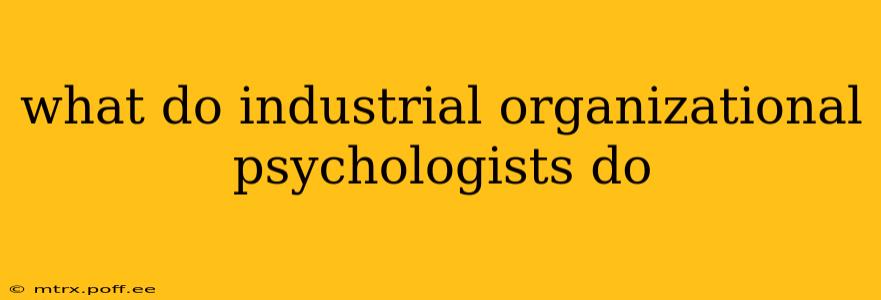Industrial-organizational (I-O) psychologists apply psychological principles to the workplace, aiming to improve employee performance, productivity, and overall well-being. They're not your typical therapists; instead, they focus on the human element within organizational settings, using scientific methods to solve real-world problems. Their work impacts everything from hiring practices to leadership training to workplace safety. This diverse field offers a wide range of career paths and exciting challenges.
What are the main areas of focus for I-O psychologists?
I-O psychology is broadly divided into two main areas: industrial psychology and organizational psychology. However, the lines often blur in practice, with many I-O psychologists working across both areas.
Industrial Psychology: This branch focuses on the individual employee and their relationship with the organization. Key areas include:
- Selection and Placement: Developing and implementing effective methods for recruiting, selecting, and placing employees in roles that best suit their skills and abilities. This involves creating job analyses, designing assessments (tests, interviews, simulations), and ensuring fairness and legality throughout the hiring process.
- Training and Development: Designing and delivering training programs to improve employee skills, knowledge, and performance. This can range from onboarding new hires to advanced leadership development.
- Performance Management: Developing systems for evaluating employee performance, providing feedback, and identifying areas for improvement. This involves creating performance appraisal systems, coaching employees, and managing performance issues.
- Compensation and Benefits: Analyzing and recommending compensation and benefits packages that attract and retain talented employees, ensuring fair and competitive pay.
- Ergonomics and Human Factors: Designing workspaces and equipment to maximize efficiency, safety, and employee comfort. This includes considering factors like physical workspace design, technology usability, and reducing workplace injuries.
Organizational Psychology: This area concentrates on the organizational level, focusing on group dynamics, organizational structure, and culture. Key aspects include:
- Organizational Structure and Design: Analyzing and improving organizational structure to enhance efficiency and productivity. This includes designing organizational charts, managing communication flow, and addressing issues of power and authority.
- Organizational Culture and Climate: Assessing and modifying organizational culture and climate to create a positive and productive work environment. This often involves surveys, focus groups, and interviews to understand employee attitudes and perceptions.
- Leadership Development: Developing leadership training programs and coaching leaders to improve their effectiveness and ability to motivate and inspire employees.
- Teamwork and Collaboration: Improving teamwork and collaboration through interventions designed to build trust, enhance communication, and foster a sense of shared purpose.
- Change Management: Managing organizational change initiatives to minimize disruption and maximize employee acceptance. This can involve creating communication plans, providing employee support, and addressing resistance to change.
What types of settings do I-O psychologists work in?
I-O psychologists work in a variety of settings, including:
- Universities: Conducting research and teaching.
- Consulting firms: Providing consulting services to organizations on a wide range of HR issues.
- Government agencies: Working for government organizations to improve employee performance and efficiency.
- Corporations: Working directly for corporations in their HR or organizational development departments.
What education and skills are needed to become an I-O psychologist?
Becoming an I-O psychologist typically requires a doctoral degree (PhD or PsyD) in industrial-organizational psychology. A master's degree can open some doors, particularly in research assistant roles, but a doctorate is generally necessary for independent practice and many leadership positions. Strong research skills, statistical analysis skills, and excellent communication and interpersonal skills are essential.
What is the difference between an I-O psychologist and an HR professional?
While both I-O psychologists and HR professionals work to improve the workplace, their roles are distinct. HR professionals handle the day-to-day tasks of managing employees, including payroll, benefits, and compliance with employment laws. I-O psychologists, however, use scientific methods to study and improve workplace practices, often designing and implementing programs based on their research findings. They often act as consultants or advisors to HR departments.
How much do I-O psychologists earn?
Salaries for I-O psychologists vary based on experience, education, and location. However, they generally command competitive salaries, reflecting the high demand for their expertise.
What is the job outlook for I-O psychologists?
The job outlook for I-O psychologists is generally positive, with continued demand for their expertise in an increasingly complex and competitive business environment. Organizations are increasingly recognizing the value of applying scientific principles to human resource management and organizational effectiveness.
This overview provides a comprehensive understanding of the field of industrial-organizational psychology. The diverse nature of the work, coupled with the significant impact it has on organizations and individuals, makes it a rewarding and challenging career path.
